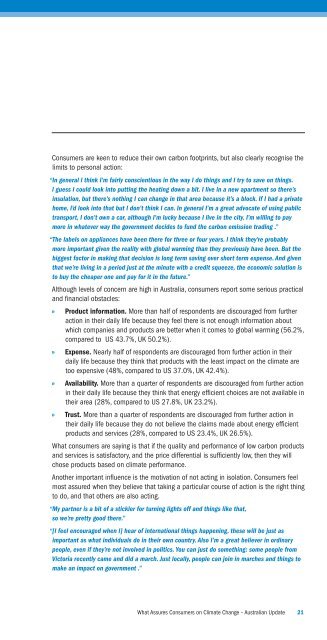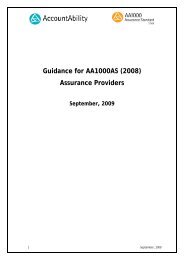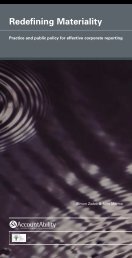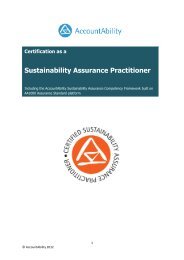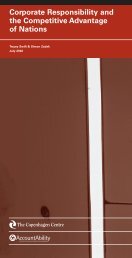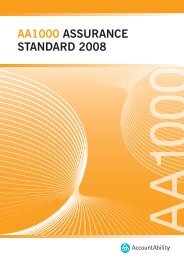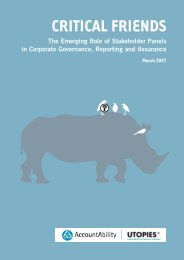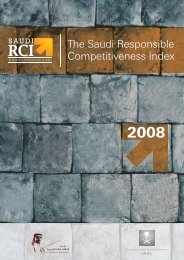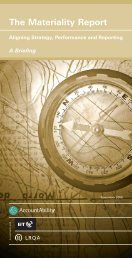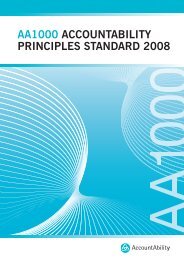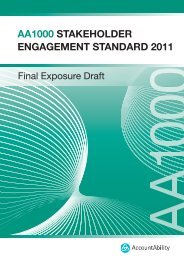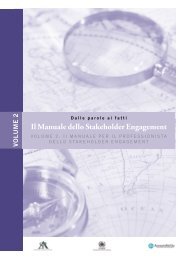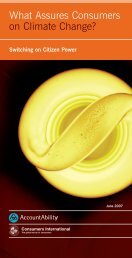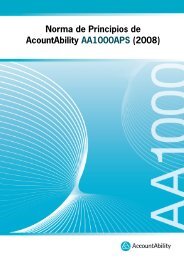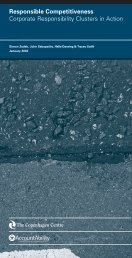Free Download - AccountAbility
Free Download - AccountAbility
Free Download - AccountAbility
- No tags were found...
You also want an ePaper? Increase the reach of your titles
YUMPU automatically turns print PDFs into web optimized ePapers that Google loves.
Consumers are keen to reduce their own carbon footprints, but also clearly recognise thelimits to personal action:“In general I think I’m fairly conscientious in the way I do things and I try to save on things.I guess I could look into putting the heating down a bit. I live in a new apartment so there’sinsulation, but there’s nothing I can change in that area because it’s a block. If I had a privatehome, I’d look into that but I don’t think I can. In general I’m a great advocate of using publictransport, I don’t own a car, although I’m lucky because I live in the city. I’m willing to paymore in whatever way the government decides to fund the carbon emission trading .”“The labels on appliances have been there for three or four years. I think they’re probablymore important given the reality with global warming than they previously have been. But thebiggest factor in making that decision is long term saving over short term expense. And giventhat we’re living in a period just at the minute with a credit squeeze, the economic solution isto buy the cheaper one and pay for it in the future.”Although levels of concern are high in Australia, consumers report some serious practicaland fi nancial obstacles:» Product information. More than half of respondents are discouraged from furtheraction in their daily life because they feel there is not enough information aboutwhich companies and products are better when it comes to global warming (56.2%,compared to US 43.7%, UK 50.2%).» Expense. Nearly half of respondents are discouraged from further action in theirdaily life because they think that products with the least impact on the climate aretoo expensive (48%, compared to US 37.0%, UK 42.4%).» Availability. More than a quarter of respondents are discouraged from further actionin their daily life because they think that energy effi cient choices are not available intheir area (28%, compared to US 27.8%, UK 23.2%).» Trust. More than a quarter of respondents are discouraged from further action intheir daily life because they do not believe the claims made about energy effi cientproducts and services (28%, compared to US 23.4%, UK 26.5%).What consumers are saying is that if the quality and performance of low carbon productsand services is satisfactory, and the price differential is suffi ciently low, then they willchose products based on climate performance.Another important infl uence is the motivation of not acting in isolation. Consumers feelmost assured when they believe that taking a particular course of action is the right thingto do, and that others are also acting.“My partner is a bit of a stickler for turning lights off and things like that,so we’re pretty good there.”“[I feel encouraged when I] hear of international things happening, these will be just asimportant as what individuals do in their own country. Also I’m a great believer in ordinarypeople, even if they’re not involved in politics. You can just do something: some people fromVictoria recently came and did a march. Just locally, people can join in marches and things tomake an impact on government .”What Assures Consumers on Climate Change – Australian Update 21


